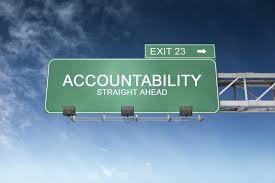 I just read an interesting article at one of my favorite sites, Forbes Woman. The title was The Top 5 Myths Of the Chronically Unsuccessful.
I just read an interesting article at one of my favorite sites, Forbes Woman. The title was The Top 5 Myths Of the Chronically Unsuccessful.
As I read further into this article, I had the sneaking suspicion that all five of the “myths” were going to relate to a lack of accountability. No surprise — they all did!
Let me list author Kathy Caprino’s five “myths” (aka excuses for failure), and then we can discuss how they figure into accountability.
1. Where you are today is 100% the fault of outside forces
2. Your success will come in a flick of a switch
3. Your introversion is a valid excuse for your lack of success
4. Your skills and talents are enough to get you work
5. Your need to make money is a compelling enough reason for people to employ you
If you’re reading these five points and find yourself nodding or agreeing with any of them, you might need some attitude readjustment — that is if you’d really like to kick your career into high gear and have the success you’ve always dreamed of.
Because accountability, in essence, is an attitude.
It’s a mindset that says I AM RESPONSIBLE for everything in my life and career. It’s a belief system that once mastered, will greatly enhance your personal power and ability to succeed.
Let’s start with what Merriam Webster has to say on the subject: Accountability: an obligation or willingness to accept responsibility or to account for one’s actions.
How does that definition conflict with the five myths of the chronically unsuccessful? Allow me to quote from my own book, Accountability: Four Keys to Manage Success (Yours and Others)?
“You have a choice. Play the blame game or accept responsibility for your performance and the results it yields.”
Here’s the rub: The opposite of being accountable is being a victim!
Do you see yourself as a victim of uncaring bosses, a crappy economy, the double standard, the glass ceiling, or anything else outside of your own possible shortcomings? Do you believe the world, the government, your company, or anything or anyone else owes you a living? Are you happy with being a passive victim of circumstance or your own self-limiting beliefs?
Again, from Accountability: “There are many things you can do to turn around your attitude. Start by committing to this basic premise: I own my attitude — it is a choice. By accepting 100% accountability for your attitude, you have folded your hand and walked away from the blame game. It’s probably the most important step in becoming truly accountable.”
100% accountability might sound daunting at first, because it leaves you with no more excuses. And we all like our excuses, don’t we? It leaves us with no one else to blame — not even ourselves.
There is a big difference in attitude (and results) between taking responsibility or accountability for ourselves, and blaming ourselves for what didn’t go right.
Accountability is constructive; blame is destructive.
Accountability opens the door to learn and grow from our experiences; blame closes that door and pushes us down.
Accountability is empowering; blame is the preferred fallback position of the victim.
Accountable or victim? It’s entirely up to you.
